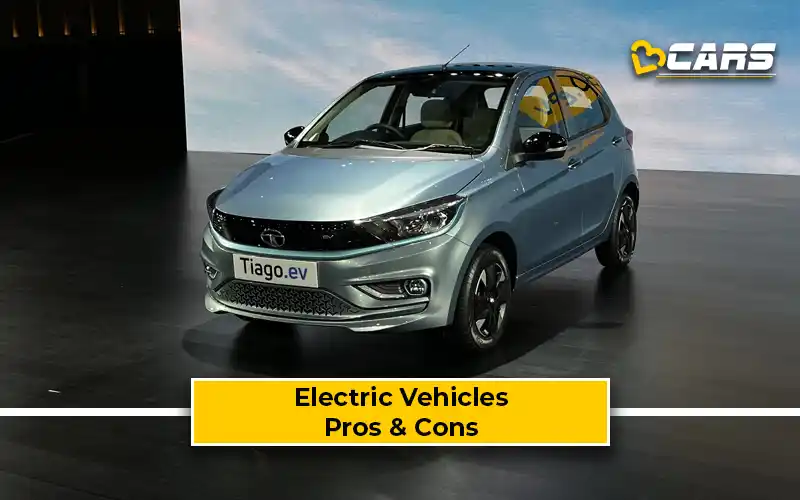Electric Vehicles - Pros And Cons | V3Cars
As you already know that the international community is pushing for alternative fuels to limit climate change and get a handle on pollution. Among the options the Indian government is considering are electric vehicles, EVs or electric cars and hydrogen fuel-cell vehicles of FCVs. in this article, we’ll briefly understand the workings of electric cars and then discuss the pros and cons of electric vehicles. With this information, you can decide if you should wait for electric vehicles or pick another type of alternative fuel car.

What Is An Electric Vehicle?
We’ve had electricity, batteries and electric motors for ages. With time, carmakers figured out a way to put it all together and run vehicles on electricity. Tesla’s efforts are deserving of an applause as they made electric vehicles desirable again.
What Are The Pros Or Advantages Of Electric Vehicles?
Below are the 7 major benefits of electric vehicles.
1. Silent, Vibration-Free, Driving Experience
Electric motors produce barely any noise and vibrations when running. So, the cabin experience while driving is drastically different from a combustion engine, which makes thousands of controlled explosions every minute.
2. Possible To Charge At Home Using Cheap, Subsidised Electricity
We pay huge taxes on petrol and diesel fuels. Even CNG carries surprisingly high taxes considering that it’s a byproduct of extracting fuel from wells. Electricity, on the other hand, is a basic necessity and instead carries subsidised rates for domestic use. So, using cheap subsidised electricity for transportation is immensely cheaper than a petrol or even a diesel car. This is at least true in terms of fuel costs.
3. Possible To Produce FREE Fuel At Home Using Solar/Wind Turbine At Home
You can go one step further and install solar and wind power at home for domestic use. With this, you can produce free electricity at home and practically run the car for FREE — FOREVER. Now that’s a deal of a lifetime, literally.
4. Fuel Production & Distribution Infrastructure Is Already In Place
Unlike flex fuel, which is on its way to entering mass production and hydrogen, which is at least a decade away from entering mass production, electricity is already available in every household. So, the fuel production and distribution infrastructure is already in place for an electric vehicle.
5. High-Torque At Low RPMs
Unlike petrol, diesel, CNG or flex-fuel engines, an electric motor doesn’t need to spin very fast to start churning out good torque for acceleration. EVs make most of their torque from practically crawling speeds and therefore offer great drivability in the city and stop-and-go traffic.
6. Offers Significantly Lower Maintenance & Running Costs From Day 1
EVs don’t have engines and a thousand moving parts, which need lubrication. So, in an electric vehicle, you don’t need to replace engine oil, oil filter, air filter, fuel filter and certain gaskets. This drastically reduces the maintenance cost as routine upkeep only includes maintaining or replacing brake pads, tyres, 12V battery (if applicable), brake fluid, tyre and coolant (for battery/motor cooling). That’s still a good number of things but most of these only need upkeep once every 40,000 - 50,000 kilometres.
7. Option Of Public Fast Charging Stations, Which Are Scaling Up Rapidly
In case you run out of charge in the batteries out on the highway during a road trip, a public charging station should help you out. Fortunately, these are DC fast charging stations and will take less than one hour for most mass market cars to fill up the batteries.
What Are The Cons Or Problems With Electric Vehicles?
Here are the 7 notable disadvantages of electric vehicles.
1. Limited Range & Single-Speed Transmission Make Them Unsuitable For Highway Use
While electric vehicles are very efficient at city speeds and have a lot of torque at low RPMs, at high speeds, they run out of steam and are very inefficient. Combustion engines use a multi-speed transmission for this very reason. Unfortunately, most EVs use a single-speed reduction gearbox and offer poor efficiency for expressway use. Larger petrol and diesel engines, on the other hand, are very efficient at high speeds.
The Porsche Taycan is the only electric car in India with a 2-speed automatic transmission, which helps it comfortably cruise at expressway speeds while staying in its efficient RPM zone and delivering good torque at the same time.
2. DC Fast Charging Will Cost Significantly More Than Home Charging
Point #1: Electricity for commercial use costs more than domestic electricity.
Point #2: The companies installing EV chargers across the country are in it to make money.
Add both of these up and you can expect to pay upwards of Rs. 20 per unit or kWh of electricity in the next few years. The lower costs you see right now are temporary to help with EV adoption. This also helps these companies acquire new customers and limiting profits or even running a loss in the beginning is one way of ramping up the usage.
3. Even DC Fast Charging Isn’t As Fast & Convenient As Filling Up Liquid Fuel
Yes, DC fast charging is indeed fast. But it’s not fill-up-my-tank fast. You’ll have to wait 30 minutes to one-and-a-half hours to charge up your car. During this time, you’ll have to find a decent place to kill time. Time is a limited resource for all of us and we should use it judiciously and you may have to spend more of it if there’s a queue at the charging station.
4. Upfront Purchase Costs Are Still Considerably Higher Than Petrol/Diesel Cars
Yes. EVs have negligible fuel costs compared to a petrol car. Yes, electric cars have much lower maintenance costs compared to a petrol car. Yes, electric cars have much lower taxes, high subsidies in several states and little-to-no registration fees.
Still, somehow, it takes more than 1,00,000km to recover the higher upfront costs we’re paying for an electric car over a comparable petrol or CNG car.
Also Read: Tata Tiago EV Vs Petrol-Automatic - Kilometre-To-Breakeven Calculation
Tata Tiago EV Vs CNG-Manual - Kilometre-To-Breakeven Calculation
In the case of the Tata Tiago EV, it’ll take you 1.14 lakh kilometres to recover the higher upfront cost you’re paying for an EV over the petrol model. In the case of CNG, this figure is even higher at 1.25 lakh kilometre.
The km-to-breakeven figure for CNG is only 40,000km in the case of Dzire.
Also Read: Maruti Suzuki Dzire Petrol Or CNG? Mileage & Running Cost Comparison
5. Giving Subsidised Fuel instead Of Earning Tax Revenues Is Not Sustainable For Govt
On one hand, as an electric car owner, you’re not paying huge taxes, which are applicable on petrol and diesel. On top of that, you’re mostly using subsidised electricity meant for domestic use.
It’s a double whammy for the government. All big political parties in the state as well as the centre, regardless of their political affiliations, can disagree on almost all issues. But increasing taxes is one thing that brings them all together. So, you can’t escape the eventual tax hikes using EVs and cheap electricity for transportation. Sooner or later, the government will find a way to figure out who’s using a lot of domestic electricity and an electric vehicle. The adhaar card number will certainly help them track down the citizens evading the taxes, which the lawmakers think we owe their government.
Also Read: 5 Reasons Why Electric Is NOT The Future - Hydrogen Is
6. If Adoption Goes Up Drastically, EV Taxation May GO Higher Than Petrol/Diesel Cars
Just like paying negligible taxes on the fuel, which carries a sin-like tax, buying the electric car at subsidised rate also can’t go unnoticed. It’s naive to think that the government doesn’t realise this loophole. But under international pressure and public opinion around climate change, the government doesn’t have an alternative fuel option as readily available as EVs. So, you can enjoy it while the party lasts but it won’t last forever. The governments around the world are also working towards improving the production of hydrogen to improve FCV adoption. The Indian government also sees flex-fuel as an alternative fuel for the next few decades. It should give them enough time to scale up green hydrogen production and start heavily taxing electric vehicles to promote hydrogen fuel-cell vehicle adoption.
7. Lugging Dead Weight For Longer Range
Unlike a petrol or diesel car, as the car runs and gets lighter, an EV remains as heavy even when it’s running out of juice as it was when you unplugged it from the charging point.
So, if you want a long-range EV, then you have to shell out for a bigger battery pack. This also means lugging around dead weight, which isn’t helping with efficiency at all.


the Electricity Charge per Unit in Mumbai is less than 6 Rs . Precisely 5.04 only https://www.adanielectricity.com/-/media/Feature/ElectricityNew/Tariff/Latest-Tariff.pdf?la=en Kindly recalculate.
This article provides a comprehensive overview of electric vehicles (EVs), highlighting their significant advantages. The silent, vibration-free driving experience, cost-effective home charging using subsidised electricity, and the potential to generate free fuel through solar or wind power make EVs an appealing choice. With an existing infrastructure for electricity distribution, high torque at low RPMs, and lower maintenance costs, EVs present a compelling case for environmentally conscious consumers. The mention of public fast charging stations adds to the convenience. For those interested in EV chargers, Dormitxelectric.com emerges as a reliable consultant, contributing to the growing EV landscape.
Audi Cars in India
RS Q8
₹2.49 Cr*
*Ex-showroom priceQ7
₹88.66 - ₹97.81 lakh*
*Ex-showroom priceQ8
₹1.17 Cr*
*Ex-showroom priceS5
₹75.80 lakh*
*Ex-showroom priceQ8 E-Tron
₹1.15 - ₹1.27 Cr*
*Ex-showroom priceQ8 E-Tron
Sportback
₹1.19 - ₹1.32 Cr*
*Ex-showroom priceQ3 Sportback
₹54.22 lakh*
*Ex-showroom priceRS E-Tron
GT
₹1.95 Cr*
*Ex-showroom priceQ3
₹43.81 - ₹53.17 lakh*
*Ex-showroom priceA8 L
₹1.34 - ₹1.63 Cr*
*Ex-showroom priceE-Tron
₹1.02 - ₹1.25 Cr*
*Ex-showroom priceE-Tron GT
₹1.72 Cr*
*Ex-showroom priceA6
₹64.09 - ₹70.44 lakh*
*Ex-showroom priceA4
₹45.34 - ₹53.50 lakh*
*Ex-showroom priceQ5
₹65.51 - ₹72.30 lakh*
*Ex-showroom priceRS 5
₹1.13 Cr*
*Ex-showroom priceUpcoming Audi Cars
RS3
₹85.00 lakh*
*Expected PriceExpected Launch Jan 2027
Latest Audi Cars Videos
Living with Audi Q5 | Long Term Review | Pros & Cons | Expectation vs Reality
Why Are Luxury Cars Better EVs? | 2000km Review of Audi Q8 e-tron | 400km Range, Smart Braking
Customisable DRLs & New Features Of The 2024 Audi Q8 Facelift | Quick Review
Audi A8 L Security Walkaround — Safer Than Your 5-star Rated Car!
Audi Q8 e-tron Driven in Bengaluru | Real Life Range Test | Kitne km Chalegi? | July 2023
Audi Q3 Sportback Practicality Test | Rear Seat & Boot Space Review | Buy Q3 or Q3 Sportback?
Mumbai-Delhi Expressway Drive via Statue of Unity in Audi Q7 | Travelogue | March 2023
2 din mein Audi e-tron ko bina charge kiye xxxkm chalaya! | Detailed Review w/ Electric Range Test
Audi Q7 Petrol Review | 0-100, Fuel Efficiency, Third Row Space | The Sensible Review | Dec 2022
Audi Q3 Petrol First Drive Review | The First Impression | Dec 2022
A4 Important Links